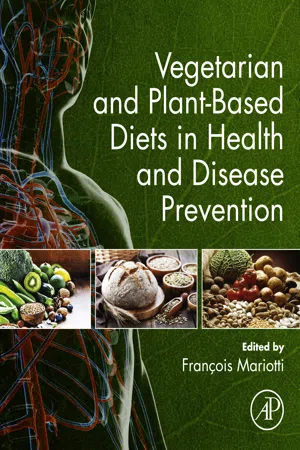1. Introduction
Vegetarianism refers to the practice of abstaining from the consumption of one or more types of foods from animal origin, especially flesh from animals. A brief overview of the background and history of vegetarianism is found in Wikipedia (Anonymous, 2016). The term “vegetarian” was first used in public around 1840, possibly as a combination of vegetable and -arian as a descriptor of a person’s characteristics. The term was popularized in subsequent years in Western Europe by the foundation of national vegetarian societies, as well as the International Vegetarian Union. However, vegetarian tradition is much older, especially in India, where the oldest records date back to several centuries BC. In ancient Europe, vegetarianism was probably uncommon, and in the middle ages, several monk orders avoided meat, but not fish, for ascetic reasons. Eating fish instead of meat on Fridays has continued to be a very common Roman Catholic tradition in many parts of the world. In this book, “plant-based diets” refer to diets predominantly based on plant foods, including most vegetarian diets.
2. Underlying Motivation of Plant-Based and Vegetarian Diets
There is extensive literature on reasons for choosing a vegetarian diet. Some reasons for avoiding meat and/or other animal products are these:
• ethical reasons, related to killing animals and/or animal welfare;
• ecological reasons, especially the low efficiency of producing animal food (both in terms of calories and protein) from edible plant foods in relation to the world food situation and the growing world population;
• health reasons, related to the notion that consumption of large amounts of animal products high in saturated fat is associated with a wide variety of diseases in affluent societies. Another health reason may be the presence of contaminants, additives, or other unwanted substances in animal products;
• disliking certain types of animal food. This is a very common reason for avoiding one or more specific types of animal foods, e.g., certain types of fish, poultry, pork, beef, lamb, etc.
These categories may be simplified to two main reasons for being vegetarian, as applied by many authors: ethical reasons (ethical vegetarians) or health reason (health vegetarians). Of note, health effects of diet are caused by the actual foods eaten, regardless of the underlying motivation. Millions of people around the globe eat diets that are predominantly or even exclusively plant-based because animal foods are either locally unavailable or unaffordable. If we define vegetarianism as actual behavior, regardless of underlying motivation, these people would be vegetarians. Indeed, the health effects of “enforced plant-based diets” may, in some respects, resemble the health effects of “voluntary” vegetarian diets. However, the resemblance stops if unavailability of animal products due to food shortage or poverty is the cause of the enforced plant-based diets, since this will go hand in hand with otherwise suboptimal dietary composition, or even with general food shortage or famine.
Furthermore, especially in non-Western countries, vegetarianism may relate to cultural and religious adherence superimposed on other traditional determinants of vegetarian diet, as the readers can read in the first section of this book.
For the sake of consistency, in this volume, we restrict the term vegetarianism to the conscious, voluntary choice to exclude meat (poultry, beef, pork, lamb, etc.), fish, seafood (shellfish, shrimp, octopus, etc.), and possibly other animal products such as dairy and eggs from the diet.
3. Definitions
The term vegetarian will be used in this volume to include all categories of vegetarian diets and vegetarians without distinction, i.e., all diets excluding meat and fish, regardless of whether other animal products such as dairy and/or eggs are also excluded. Of note, in the literature, many authors apply the term “vegetarian” as a synonym for “ovolactovegetarian” because ovolactovegetarians are the most numerous category of vegetarians. We discourage this utilization because its meaning is ambiguous. If ovolactovegetarians are specifically meant, we will use the term “ovolactovegetarian” and not “vegetarian.”
Ovolactovegetarian: Refers to a diet composed of (or people consuming) dairy and eggs, but no meat, fish, or other seafood (shellfish, shrimp, octopus, etc.). Some definitions (e.g., by the Dutch Vegetarian Society) restrict the term ovolactovegetarian to someone who avoids not only flesh from killed animals (meat and fish) but also gelatin and cheese curdled with rennet of animal origin. Here, we will not follow this definition.
Lactovegetarian: As ovolactovegetarian, consuming dairy but not eggs.
Ovovegetarian: As ovolactovegetarian, consuming eggs but not dairy.
Pescetarian/pesco-vegetarian: Refers to a diet containing (or people who eat) fish and/or seafood but no meat.
Vegan: Refers to a diet not containing (or people who do not consume) any animal foods. Also, by-products of animal husbandry, e.g., milk and honey, are excluded from the diet.
Many vegans also exclude other animal-derived products such as leather, but since the focus of this volume is on diet, we will not make a distinction regarding the use of nonedible products.
Semivegetarian, also called “flexitarian”: Refers to people following a predominantly vegetarian diet of any type, but with the occasional inclusion of animal products; usually, the term “semi” refers to meat and fish. In scientific literature, it is essential to define what is meant by “occasional,” since this could just as well be once per month as three times per week. In scientific studies, different definitions may be relevant depending on the context. For example, in a prospective cohort study on the etiological relation between meat consumption and cancer, a cutoff point of one time per week would be relevant; whereas in studies on nutritional adequacy of low-meat diets, a cutoff point of two to three times per week would be more relevant. Nevertheless, the fact that any cutoff point is arbitrary has contributed to the lack of congruence in the scientific literature. For the pre...
